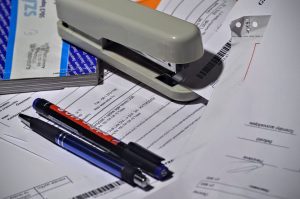Businesses in the accounting industry have unique risks that only they face. For this reason, you need to partner with an insurance agent who is comfortable working with businesses in this industry. Slips, trips, and falls do not cause a large problem to this industry because the employees do not move around a lot and there is limited interaction with the public. Repetitive injury like carpal tunnel and back problems can arise from long periods of time sitting at a desk.

Bigger risk arise from the fact that you are interacting with individuals and businesses private sensitive financial documents. These risks are typically low in frequency, but can most definitely be severe if the wrong information falls into the wrong hands. Additional risks arise from the fact that accounting businesses are providing professional advice and services. Because of the enormous amount of risk in all of these areas of the business, it is important to get an all encompassing insurance package. Consulting with an experienced independent insurance agent is always the best way to know for sure you are getting the most comprehensive coverage at rock bottom prices. Here are TKTK Insurance policies all accounting services firms should strongly consider.
Coverages Recommended for Accounting Professionals:
✓ General Liability Insurance
✓ Professional Liability Insurance (E&O)
✓ Hired and Non-Owned Auto
✓ Workers Compensation Insurance
✓ Employee Dishonesty Bond
General Liability Insurance
In most states, this coverage is required by law to be in business. For this reason, most business owners start with this coverage and workers compensation insurance. The risk of a General Liability claim is minimal since most operations are not conducted on the businesses property and most of the client contact is electronic or by mail. When clients do visit the office, they should be kept separate from the main office area in an attempt to prevent them from hearing conversations regarding other clients’ confidential information. Off-premises exposures arise when employees are engaged in sales visits, training sessions, and physical audits at the customer’s premises. There should be policies and training as to off-site conduct by employees.
Professional Liability Coverage
The risk factors accounting services businesses face in relation to Professional Liability Coverage include the services the business provides, the firm’s credentials, the employees experience as well as the ratio of professional to clerical employees. Failure to conduct thorough background checks to verify credentials and education can pose a significant risk. In some circumstances it can cause a claim not to be covered. The risk of E&O claims increase if clerical workers are allowed to do tasks that only the professionals should handle and if error checking procedures are inadequate. Most carriers have plans in place for you to follow if you do not already have such plans in place.
Hired and Non-Owned Auto Insurance
Risks associated with automobiles are generally limited to hired and non-owned auto insurance. This is because most accounting businesses do not have a need to buy vehicles specifically for business purposes. However, many employees probably do use their personal vehicles for business purposes to visit clients facilities. In these situations, there should be clear procedures in place regarding personal use by employees and their family members. The age, training, experience, and records of each driver, as well as age, condition, and maintenance of the vehicles, are all important items to consider if your business needs a commercial auto policy.
Workers Compensation Coverage
Workers compensation is a form of liability insurance required for employers in 48 out of 50 states. This type of insurance compensates injured workers for lost wages and medical costs while giving business owners the peace of mind to know they will not be sued for accidents that occur as part of normal operating procedures. Accounting firms don’t typically have a hard time finding affordable workers compensation coverage because of the light physical duty of the industry. Repetitive injuries like carpal tunnel are the most severe type of risk employees face. Offering adequate chairs and even desk that allow employees to stand for part of the day are a worthy investment.
Employee Dishonesty Bond
There are two main types of criminal insurance related to employee dishonesty. The two types of coverage that a business can purchase to prevent losses related to the criminal activity committed by your employees are Commercial Crime Insurance and a Fidelity Bond. A Fidelity Bond is a form of insurance that covers losses resulting from employee dishonesty. This can help cover any lost money or securities that result from an employee’s dishonest acts. A Fidelity Bond is meant to act as a security against potential fraudulent employees or disgruntled employees. A Commercial Crime Insurance Policy is typically designed to meet the needs of organizations other than financial institutions (such as banks). A commercial crime policy typically provides several different types of crime coverage like: employee dishonesty, forgery, computer fraud, funds transfer fraud, kidnap, etc. Both of these policies will cover losses due to the actions of your employees. If you are not sure which type is best for you it is always best to consult with an experienced independent insurance agent to make sure you are properly covered.
Class Codes ASSOCIATED WITH THE ACCOUNTING INDUSTRY
Business Liability Category: Service Businesses
SIC Business Insurance Codes:
- 8721: Accounting, Auditing and Bookkeeping Services
- 7291: Tax Return Preparation Services
NAICS Liability Classifications:
- 541211: Offices of Certified Public Accountants
- 541213: Tax Preparation Services
- 541214: Payroll Services
- 541219: Other Accounting Services
Business ISO General Liability:
- 41677: Accounting/Consulting
Common Workers Compensation Class Codes:
- 8803: Accountant, Auditor; traveling
- 8810: Clerical; office only

